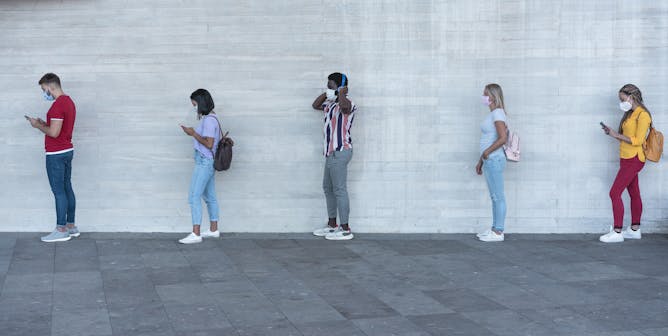|
|
|
|
Some time after March 2020’s stay-at-home order, I began reading excerpts from Samuel Pepys’ diary. In one of them, he strolls for the first time past a household infected by the great plague. A red cross is daubed on the door, next to the chilling words “Lord have mercy upon us”. Comforting lockdown reading this was not. But I was grateful for the historical record Pepys left behind, which helped make some sense of the unfolding pandemic.
Perhaps there’s a modern-day Pepys scribbling away in some London backwater. But today’s pandemic has taken place in a connected world, one in which writing and publishing have been democratised by the likes of Facebook and Twitter. So where better to search for an account of the COVID-19 crisis than in an archive of over 84 million pandemic-related tweets? One of the linguistics experts behind this archive has shared his hopes for what looks set to be a key historical document that’ll help future generations understand our strange times.
Somewhere in the archive, you’ll find Twitter users calling for a rethink on how, where and when we work. We’ve heard from an economics professor who believes that, post-pandemic, we’ll have the perfect opportunity to move to a four-day week. And promising new research has yielded a novel way to recycle electric vehicle batteries, using bacteria to “bioleach” in-demand precious metals from electrical
waste.
|
Alex King
Commissioning Editor, Science + Technology
|

|
|

DisobeyArt/Shutterstock
Robert Lawson, Birmingham City University
During the pandemic, researchers have treated Twitter as a sprawling and evolving historical document.
|

Shutterstock/Alex Segre
David Spencer, University of Leeds
Our approach to work has had to adjust, so let's change even more.
|

Paul Craft/Shutterstock
Sebastien Farnaud, Coventry University
With an average shelf life of nine years, the coming tsunami of waste EV batteries needs action now.
|
Politics + Society
|
-
Tracey Warren, University of Nottingham; Clare Lyonette, University of Warwick
Focusing solely on home working neglects the fact that most employees in the UK rarely or never worked from home after the pandemic
-
Louise Kettle, University of Nottingham
The election result seems a foregone conclusion, but the country's political future is far from certain.
-
Umut Korkut, Glasgow Caledonian University; Roland Fazekas, Glasgow Caledonian University
A new anti-LGBTQ+ law in Hungary is populist Prime Minister Viktor Orbán's tactic for securing support ahead of elections.
-
Anna Plunkett, King's College London
Myanmar's constitution provides for an independent legal system. In practice it is anything but.
-
Gavin Evans, Birkbeck, University of London
Kaunda will be remembered as a giant of 20th century African nationalism -- a leader who gave refuge to revolutionary movements, a relatively benign autocrat and an international diplomat.
-
Gemma Ware, The Conversation; Daniel Merino, The Conversation
Plus, what the study of 700-year old garbage is revealing about who lived in Islamic Andalusia. Listen to episode 20 of The Conversation Weekly.
|
|
Health + Medicine
|
-
Dominic Wilkinson, University of Oxford; Julian Savulescu, University of Oxford
The UK government is set to make it compulsory for all staff working in care homes in England to get the COVID vaccine. Two ethicists discuss the pros and cons.
-
Christina Thatcher, Cardiff Metropolitan University
Plus some prompts to get you started.
-
Ruaraidh Dobson, University of Stirling; Sean Semple, University of Stirling
Around one million UK workers are exposed to smoke in their daily jobs. There needs to be more protection for these people.
|
|
Science + Technology
|
-
Tamas Szekely, University of Bath
The sexual selection of larger males may be driven by an abundance – not a scarcity – of females.
|
|
Environment + Energy
|
-
Thora Tenbrink, Bangor University
To more effectively communicate about climate change online, follow these simple rules
|
|
Business + Economy
|
-
Rosie Walters, Cardiff University
How companies love to tell us all the great things they're doing to help women.
|
|
Arts + Culture
|
-
Amanda Potter, The Open University
From its strong female lead who could take down anything in her path to its LGBT undertones, Xena: Warrior Princess stole the hearts of a truly diverse audience.
|
|
| |
Featured events
|

|
Online Oxford Martin School Event, Online, Oxfordshire, N/A, United Kingdom of Great Britain and Northern Ireland — University of Oxford
|

|
Online, Birmingham, Warwickshire, B15 2TT, United Kingdom of Great Britain and Northern Ireland — University of Birmingham
|

|
Online, Birmingham, Birmingham, B15 2TT, United Kingdom of Great Britain and Northern Ireland — University of Birmingham
|

|
Sustainable Places Research Institute, Cardiff University, Cardiff, Cardiff [Caerdydd GB-CRD], CF10 3BA, United Kingdom of Great Britain and Northern Ireland — Cardiff University
|
|
|
|
| |
| |
| |
| |
| |
|
|
|
|
|
|
|